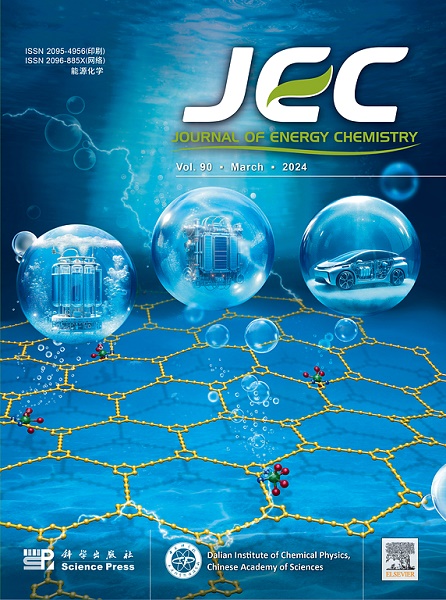Ionogel electrolyte based on porous graphitic C3N4 nanosheets for room temperature to 150 °C quasi-solid-state lithium batteries
IF 13.1
1区 化学
Q1 Energy
引用次数: 0
Abstract
Ionogels, generally formed by immobilizing ionic liquids (ILs) with polymer gelators, hold considerable promise as quasi-solid-state electrolytes (QSSEs) for lithium metal batteries (LMBs) due to their high safety and electrode compatibility. However, their practical use in high-temperature LMBs suffers from the softened polymer chains of gelator at high temperatures, leading to liquid leakage and severe growth of Li dendrite. Here, a novel inorganic ionogel (PCNIL) combining lithium salt-containing IL with porous graphitic carbon nitride nanosheets (PCN) is developed through direct physical mixing. PCNIL exhibits a superior ionic conductivity (0.75 mS cm−1) at room temperature similar to that of neat IL electrolyte (Li-IL) and a Li+ transference number (0.56) greatly higher than that of Li-IL (0.20). Furthermore, PCNIL maintains a temperature-independent shear storage modulus of up to 5 MPa from room temperature to 150 °C. Consequently, the Li|PCNIL|Li symmetrical cell demonstrates extended reversible lithium plating/stripping over 1200 h without dendritic growth. The robust mechanical strength, excellent thermal stability, and electrochemical stability of PCNIL allow Li|PCNIL|LiFePO4 cells to operate stably in a wide temperature range of 25–150 °C.
求助全文
约1分钟内获得全文
求助全文
来源期刊

Journal of Energy Chemistry
CHEMISTRY, APPLIED-CHEMISTRY, PHYSICAL
CiteScore
19.10
自引率
8.40%
发文量
3631
审稿时长
15 days
期刊介绍:
The Journal of Energy Chemistry, the official publication of Science Press and the Dalian Institute of Chemical Physics, Chinese Academy of Sciences, serves as a platform for reporting creative research and innovative applications in energy chemistry. It mainly reports on creative researches and innovative applications of chemical conversions of fossil energy, carbon dioxide, electrochemical energy and hydrogen energy, as well as the conversions of biomass and solar energy related with chemical issues to promote academic exchanges in the field of energy chemistry and to accelerate the exploration, research and development of energy science and technologies.
This journal focuses on original research papers covering various topics within energy chemistry worldwide, including:
Optimized utilization of fossil energy
Hydrogen energy
Conversion and storage of electrochemical energy
Capture, storage, and chemical conversion of carbon dioxide
Materials and nanotechnologies for energy conversion and storage
Chemistry in biomass conversion
Chemistry in the utilization of solar energy
 求助内容:
求助内容: 应助结果提醒方式:
应助结果提醒方式:


